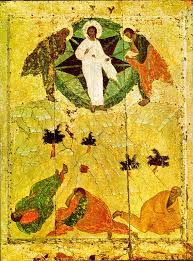Various Texts on Theology, the Divine Economy, and Virtue and  Vice, Fourth Century, #78-89
Vice, Fourth Century, #78-89
In these paragraphs, St. Maximos elucidates the stages leading to theosis (likeness to or union with God), through the interrelationships between theory and practice.
- The first stage, he tells us, is the practice of virtues, or practical philosophy. Practical philosophy, or the practice of the virtues, is effectuated by fear, devotion, and spiritual knowledge.
2. After purification through the practice of virtue, one is ready to enter the stage of “natural contemplation,” the deep, spiritual understanding of the essence of created things, beneath the surface.
3. Mystical theology, the highest stage of spiritual knowledge, transcends and unites practice and natural contemplation and “is granted only by divine wisdom.”
Reaching this stage, however, is not automatic. It is not achieved simply by fulfilling the requirements of previous stages and passing an exam. Instead, one needs the help of the Holy Spirit. And the Holy Spirit illumines only “those worthy of light;” “…those whose will and disposition have been reborn in the Spirit through the practice of the virtues.”
The Holy Spirit confers illumination “through radiant, simple and complete wisdom, rather than complex philosophical premises and clever contradictions. Prior to this higher stage of perfection, we exist in what St. Maximos calls, the “intermediate states” of being. While inhabiting these states, we are pulled in different directions and are in constant danger of slipping and losing the progress we have made. In contrast, there are no contradictory truths or changes possible in the highest state of spiritual knowledge. There is permenence, unity and the simplicity of a radiant wisdom.
Thus, having distinguished between practice and thought, surface and essence, Old and New Testament, St. Maximos takes apart the dividing line between them.
“God,” he writes, “is glorified not by mere words but by works of righteousness, which proclaim the majesty of God far more effectively than words.”
St. Maximos warns about the dangers of one without the other. Unless translated into action, words and ideas are nothing more than illusions, he tells us. Speeches on “world peace,” theoretical understanding of the scriptures or donations to an international charity mean little if you are cruel to your family or contemptuous of others. Conversely, actions and material things, bereft of spiritual knowledge, are mere idols. Physical exercise, career or clothes can become empty and exhausting obsessions without an overarching spiritual direction and understanding.
He in whom spiritual knowledge and ascetic practice are not united either makes the first an unsubstantial illusion or turns the second into a lifeless idol. For spiritual knowledge not put into practice does not differ in any way from illusion, lacking such practice to give it real substance; and practice uninformed by intelligence is like an idol, since it has no knowledge to animate it.
When one’s journey nears a state of perfection, not only there are no divisions, but one gift enhances the other in a continuous and self-sustaining loop. In our life in Christ we live “the mystery of our salvation” which informs our way of life with intelligence and makes intelligence the glory of our way of life. It turns our practice of the virtues into contemplation manifest in terms of action, and our contemplation into divinely initiated practice. To put it briefly, it makes virtue the manifestation of spiritual knowledge and spiritual knowledge the sustaining power of virtue.”
When both virtue and spiritual knowledge unite, “a single compact wisdom” is displayed, modeling the wisdom of the Holy Spirit.” It is only then that we lead full, authentic lives and experience the completeness and simplicity of true union with God.
In this way we may know that by grace both Testaments agree in all things with each other, in their combination consummating a mystery more single and undivided than soul and body in a human being.